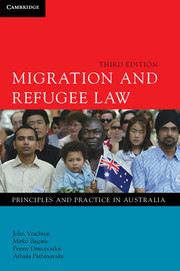Book contents
- Frontmatter
- Contents
- Table of cases
- Table of statutes
- Preface to the third edition
- Acknowledgments
- 1 Historical context to migration
- 2 Immigration control: An overview
- 3 Basic migration legislation and policy
- 4 The visa system and application procedures
- 5 Family and interdependency migration and other Australia-based visas
- 6 Business and investment visas
- 7 Skills-based visas
- 8 Temporary visas
- 9 Miscellaneous visas
- 10 Common visa requirements
- 11 Compliance: Unlawful non-citizens, removal and deportation
- 12 History of the Refugees Convention and definitional framework
- 13 Refugee and humanitarian visas: The statutory structure
- 14 Convention grounds
- 15 Persecution
- 16 Well-founded fear of persecution
- 17 Limits on protection of refugees – cessation, exclusion exceptions and protection by another country
- 18 Time for a fundamental rethink: Need as the criterion for assistance
- 19 The determination and review process for migration and refugee decisions
- Index
- References
15 - Persecution
Published online by Cambridge University Press: 05 June 2012
- Frontmatter
- Contents
- Table of cases
- Table of statutes
- Preface to the third edition
- Acknowledgments
- 1 Historical context to migration
- 2 Immigration control: An overview
- 3 Basic migration legislation and policy
- 4 The visa system and application procedures
- 5 Family and interdependency migration and other Australia-based visas
- 6 Business and investment visas
- 7 Skills-based visas
- 8 Temporary visas
- 9 Miscellaneous visas
- 10 Common visa requirements
- 11 Compliance: Unlawful non-citizens, removal and deportation
- 12 History of the Refugees Convention and definitional framework
- 13 Refugee and humanitarian visas: The statutory structure
- 14 Convention grounds
- 15 Persecution
- 16 Well-founded fear of persecution
- 17 Limits on protection of refugees – cessation, exclusion exceptions and protection by another country
- 18 Time for a fundamental rethink: Need as the criterion for assistance
- 19 The determination and review process for migration and refugee decisions
- Index
- References
Summary
Overview of persecution
As noted in Chapter 11, in order to qualify for refugee status, the harm feared by a claimant must constitute ‘persecution’. This renders the notion of ‘persecution’ central to the concept of a refugee.
The term ‘persecution’ derives from the Latin persequi, which means ‘to follow with hostile intent, or pursue’. The Convention drafters deliberately did not define the term ‘persecution’ with any degree of exactness, to ensure that the concept could be applied to new situations. To judge if a person has suffered, or is at risk of suffering, persecution under the Convention, the severity of the harm and the importance of the right affected are measured on quantitative and qualitative levels. Although the level of severity of harm must generally be high, it may vary depending on the importance of the relevant human right. As is noted by the UNHCR, ‘there is no universally accepted definition of “persecution”, and various attempts to formulate such a definition have met with little success’. Thus states have a wide discretion in interpreting the term. This has resulted in numerous irreconcilable decisions regarding its meaning. Goodwin-Gill has commented in relation to the concept of persecution that ‘practice reveals no coherent or consistent jurisprudence’.
- Type
- Chapter
- Information
- Migration and Refugee LawPrinciples and Practice in Australia, pp. 222 - 256Publisher: Cambridge University PressPrint publication year: 2011



